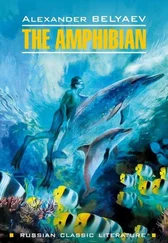Surfacing, he spotted what looked to him like a piece of white sail torn by the storm off some fishing smack. Coming nearer he realized to his surprise that it was a woman, or rather a young girl, tied to a board of wood. Was she dead? The thought so upset him that for the first time in his life a feeling of hostility towards the ocean stirred within him.
Or perhaps she was only unconscious? Holding up the girl’s pretty head that was lolling to one side, Ichthyander grasped the board and pushed shorewards.
He swam for all he was worth, as he had never swum before, stopping only to see to the girl’s head, which kept slipping off the board. And he kept whispering to her as he used to whisper to fish in trouble, “Wait a little, it’ll soon be over.” He wanted the girl to open her eyes and yet was afraid of it. He wanted her to come to life and yet was afraid she would get frightened. Had he not better take off his goggles and gloves? But that would take time and then he would not be able to make half as much progress with his gloves off. And so he pressed on, pushing the board with the girl closer and closer inshore.
At last he reached the heavy surf. Caution was needed. The waves were propelling him shorewards. Ichthyander kept feeling with his foot for a shallow place. Finally He struck bottom, safely steered his burden ashore, untied the girl and, laying her in the shade of a bush-grown dune, began administering artificial respiration.
He thought he saw her eyelids quiver, and putting his ear against the girl’s heart he detected a faint beating. She was alive! He very nearly cried out with joy.
Then the girl half-opened her eyes, caught sight of Ichthyander and shuddered and shut her eyes again. Ichthyander was at once gladdened and chagrined. Well, anyway, I’ve saved the girl, he thought. Now he ought to be going away-to avoid frightening her. But could he leave her as she was now — all alone too? Even as he thought this he heard somebody’s heavy footfalls. This was no time for indecision. Ichthyander ducked into a wave, swam underwater to the nearest reef, broke surface in its shelter and watched developments.
From behind the dune a swarthy man with a moustache and goatee showing from under a wide-brimmed hat swung into view. At the sight of the girl he exclaimed: “Gracias a Jesus у Maria! “, started to run towards her, then suddenly veered to the water’s edge and into the oncoming wave. Thoroughly drenched he ran back towards the girl, started artificial respiration (whatever for, Ichthyander wondered); then bent low over the girl’s face and kissed her. Presently he began speaking to her, rapidly and agitatedly. Snatches of phrases floated to Ichthyander: “I warned you… it was sheer madness… Good thing I thought of tying you to a board.”
The girl opened her eyes and raised her head a little. Her face expressed fear, followed by surprise, then indignation and displeasure. The goated man kept up a voluble flow of talk as he helped her up. But she was evidently still too weak and he eased her back onto the sand. Nor was it until about half an hour later that she could stand up again and walk. On their way they passed quite close to where Ichthyander was hiding. The girl was saying:
“So it was you who saved my life? Thank you. May God reward you for this.”
“You alone can reward me,” said the swarthy-skinned man.
The girl seemed not to hear the man’s words.
“It’s strange,” she said after a pause. “I thought I saw a monster at my side.”
“That was your imagination,” the man said. “Or again it might have been the wicked one come to claim your soul. Say a prayer and lean on my arm — with me around you needn’t be afraid of any devil.”
And they were gone, the wonder girl and the evil man who was trying to make her believe it was he who had rescued her from the sea. But Ichthyander was in no position to give him the lie. Let him do as he liked; Ichthyander had done what he could.
The girl and her companion had disappeared behind the dunes but Ichthyander was still looking their way. Then he turned round and faced the ocean. How big it was-and how empty.
A wave had tossed a silver-bellied blue-backed fish on the sand. Ichthyander looked round him: not a soul in sight. He left his cover, retrieved the fish and threw it into the water. The fish swam away but Ichthyander felt sad without knowing why. For some time he wandered about the deserted beach, picking up fish and restoring them to their element. Gradually he was carried away by his work. Soon his usual high spirits were restored and, forgetting all about time, he pressed on, only breaking for an occasional plunge to cool his gills. It wasn’t until quite dark that he finally turned for home.
Salvator was going into the mountains again-this time without Cristo. Apparently well satisfied with Cristo’s work, Salvator was leaving him behind to his now permanent duties of Ichthyander’s servant. That suited Cristo’s book for it would facilitate his meeting with Baltasar. Cristo had already sent word to him that he had discovered the “sea-devil’s” whereabouts. It was time for them to lay plans for his kidnapping.
For some time now Cristo had been living in the white-stone lichen-covered cottage and seeing much of Ichthyander. Soon they had become good friends. Ichthyander, for whom human companionship was a welcome novelty, had fairly cottoned to the old Indian, who was so ready with tales about life on land — something Ichthyander knew little about. But he knew more about life in the sea than the world’s greatest experts on the subject all rolled in one. He had a good grounding in geography, at least as far as the oceans, seas and major rivers went; and also knew something of astronomy, navigation, physics, botany and zoology. But he knew little about men, actually nothing beyond the mere fact of the existence of different races on earth, something still vaguer about their history, and as to their political and economic relations, his knowledge did not exceed that of a five-year-old.
At noon when it grew hot Ichthyander would descend into the underground cave and swim away. He would return to the cottage when the heat had abated and stay there till the next morning. But if it rained or there was a storm at the sea he would as often as not remain in the cottage the whole day and feel all right owing to the extra moisture.
The cottage was not big, just four rooms, one leading into another, and a kitchen. Cristo lived in the room next to the kitchen. Then came the dining-room and a big library (Ichthyander could read Spanish and English). The farthest and biggest room was Ichthyander’s bedroom. A big bath took up most of its centre. The bed was on the side, against one of the walls, but Ichthyander seemed to prefer the bath to it. Before going away, however, Salvator had ordered Cristo to see to it that Ichthyander slept in his bed no less than three nights a week, and so every night Cristo saw Ichthyander to bed and grumbled like an old nurse if the young man was being disobedient.
“But I find it a good deal pleasanter sleeping in the water,” protested Ichthyander.
“The Doctor’s orders were that you should sleep in bed — you mustn’t disobey your father.”
Though Ichthyander called Salvator Father, the old Indian doubted they were blood relations at all. True, the amphibian’s skin where it could be seen was rather pale, but that might be due to long immersions. Considering his elongated head, straight nose, thin lips and big sparkling eyes — Ichthyander rather struck Cristo as looking like an Araucanian.
Cristo wanted very much to see what colour Ichthyander’s body was under its close-fitting suit made of some unknown material.
Читать дальше










